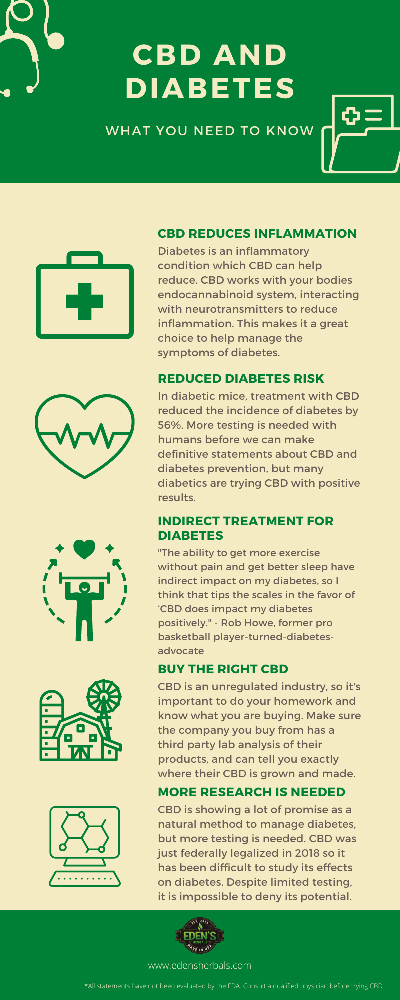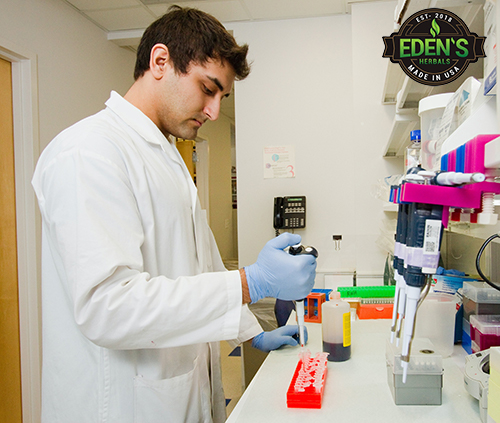 There is a lot of talk about CBD's potential to help diabetics. As more research piles up, we are seeing promising results. There is also a lot of misinformation and false advertising. The goal of this article is to set the record straight, and tell you what we do, and don't, know about CBD and diabetes.
There is a lot of talk about CBD's potential to help diabetics. As more research piles up, we are seeing promising results. There is also a lot of misinformation and false advertising. The goal of this article is to set the record straight, and tell you what we do, and don't, know about CBD and diabetes.
What is CBD Oil?
CBD - it seems to be everywhere you look lately! Billboards pepper the landscape with more and more CBD stores opening their doors. But what exactly is CBD? Is it marijuana? No, it's not. CBD oil is short for cannabidiol, which comes from the hemp plant. The hemp plant is closely related to the marijuana plant, and CBD can be found in marijuana. However, marijuana has hundreds of other ingredients that produce the high feeling, particularly tetrahydrocannabinol, or THC. THC is not typically found in CBD. Therefore, CBD does not cause highs or the potential for dependence like recreational marijuana would.
So it's Safe?
CBD has been shown to be very safe. Consumers should still be cautious when purchasing CBD. CBD is not subject to FDA safety and purity regulations like medications. Different distributors may include different ingredients in addition to the CBD oil. This makes it important to find a CBD retailer that you can trust. Make sure that they can provide a third-party lab analysis of their CBD. Also check to see that they have knowledgeable and responsive customer service representatives. Pure, natural CBD is very safe, so just make sure that you know what you are getting!
As with any supplements, it is important to speak with your doctor first. They can help to make sure that CBD does not interfere with any of your current medications, supplements, or conditions.
Why do People Use CBD?
CBD appears to alleviate the symptoms of various ailments, including acne, psoriasis, eczema, depression, anxiety, insomnia, discomfort from cancer and chemotherapy, dementia, Alzheimer's, Parkinson's disease, epilepsy, and multiple sclerosis. It has also shown to reduce inflammation. This reduces the pain and discomfort of arthritis and other chronic pain, as well as the danger of heart disease.
CBD and Inflammatory Disease
With its diverse possibilities, especially its anti-inflammatory capabilities, scientists are now wondering if CBD can also hold the key to preventing and managing diabetes. What many may not realize, is that diabetes is actually an inflammatory disease. Patients with type 2 diabetes do not produce proper amounts of insulin. This can be a result of cellular stresses such as the following.
Oxidative Stress
Free radicals form when molecules containing oxygen are not balanced with an even number of electrons. This causes oxidation, or chain reactions with other molecules in the body. You have probably heard that we should eat foods that are rich in antioxidants. That is because antioxidants provide the necessary electron to the free radicals in order to stabilize them and render them less reactive. A lack of antioxidants in the body leads to an imbalance known as oxidative stress. Free radicals are unable to fight infections and begin to cause damage to the body instead, leading to diabetes and inflammation.
 Ectopic Lipid Deposition
Ectopic Lipid Deposition
Type 2 diabetes involves inappropriate levels of the hormone insulin. Healthy bodies break food down into blood sugar. Once in the bloodstream, the pancreas receives the signal to release insulin. Insulin has two jobs. It can either be used as energy through our cells, or it can go into the liver for storage until it is needed. Once it leaves the bloodstream through either of these processes, the pancreas knows it can stop sending insulin. When we eat too much sugar, though, the pancreas sends too much insulin. Cells basically start to ignore that excess insulin, thus rendering a patient as insulin resistant. The pancreas works hard to create more and more insulin in order to receive a response, but it is to no avail as the blood sugar continues to rise. This surplus blood sugar gets stored in fat cells, instead.
Studies with rats show a clear association between insulin resistance, obesity, and inflammation. It is important to remember that an association does not mean causation, but there is a connection. This is another way in which diabetes is an inflammatory disease.
Diabetes, Inflammation, and CBD
 As we have learned, diabetes can lead to inflammation. Inflammation can also exacerbate diabetes. For example, chronic inflammation of the pancreas causes the destruction of cells that produce insulin. CBD binds to receptors related to inflammation and desensitizes them. This helps reduce inflammation. It did help rats with osteoarthritis. It is possible that its anti-inflammatory results can both help and prevent diabetes. In terms of blood sugar levels, some preliminary investigations report positive changes after using CBD. Other anecdotal evidence does not support this. However, it does appear to help pain and inflammation, which helps one get better exercise and rest, and those can help blood sugar levels.
As we have learned, diabetes can lead to inflammation. Inflammation can also exacerbate diabetes. For example, chronic inflammation of the pancreas causes the destruction of cells that produce insulin. CBD binds to receptors related to inflammation and desensitizes them. This helps reduce inflammation. It did help rats with osteoarthritis. It is possible that its anti-inflammatory results can both help and prevent diabetes. In terms of blood sugar levels, some preliminary investigations report positive changes after using CBD. Other anecdotal evidence does not support this. However, it does appear to help pain and inflammation, which helps one get better exercise and rest, and those can help blood sugar levels.
Why are There so Few Human Studies?
While the 2018 Farm Bill did legalize CBD, each state still has the authority to enforce this how they see fit. As of 2020, Idaho, Nebraska, and South Dakota still consider CBD illegal. The rest of the states vary in terms of restrictions. Some states allow it to be available almost everywhere. Others make it harder to find. What this means for science is that it is harder to organize ethical studies when the legal acceptance is still slightly controversial depending on the region in which it takes place. While scientists feel optimistic with what they are seeing with rats, more studies are needed to prove the effects of CBD in humans.
So What Have we Learned from Rats?
Studies have shown that rats with inflammation of the pancreas develop diabetes later and also have fewer immune-cell activity, (which is what destroys the insulin-producing cells,) when using CBD oil. There is much to learn in terms of humans, though. We do understand that it is our endocannabinoid system that regulates our energy metabolism and our responses to insulin. CBD influences receptors within the endocannabinoid system, but so far this varies drastically from patient to patient. One may experience a sudden drop in blood sugar after using CBD and another may notice no change at all.
 How do I Use CBD?
How do I Use CBD?
There are a few options for how to ingest CBD oil. It is even available in gummy format, but there are healthier ways to receive its effects. Many people choose to swallow droppers of oil. It is wise to discuss this with a doctor prior to starting, in order to decide how large of a dose to take. There are people who specialize as Holistic Cannabis Practitioners and provide cannabis counseling! Another option is to place the desired number of drops underneath your tongue. The purpose of this method is the blood vessels under the tongue absorb the oil directly, thus bypassing the time it would take to go through the digestive system. It is possible to rub the oil over inflamed joints for relief. This will not likely have an effect on the entire body, however, but will help with the irritated joints.
Are There Side Effects?
Some people report the following side effects: nausea, irritability, and fatigue. It can also raise coumadin, a blood thinner, in your system as well as other medications that you may be taking.
 Final Thoughts
Final Thoughts
In weighing the evidence that we do have available, it seems like the best advice we can give, is to approach CBD with an open mind. If you are curious about CBD and diabetes, give it a try, and see what works for you. There is a lot of promising research and more human studies will likely be forthcoming. While some patients appear to have very positive results after beginning a CBD regimen; others find it has no effect. None, however, report serious side effects or a worsening of blood sugar levels following CBD. Therefore, it may be worth a try. Just remember to speak with your doctor first and research reputable sources of CBD.
Want to learn more about CBD and diabetes? Contact Eden's Herbals at support@edensherbals.com today!


